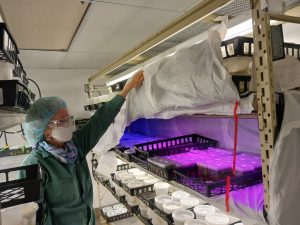The SPUD Unit was established in New Liskeard in 1983 under the recommendation of provincial potato specialist Sam Squire. He and others recognized the geographic importance of the cooler spring weather, along with the beneficial jet stream patterns that gives this region a competitive advantage for pest control. The milder and cleaner environment was found to be very beneficial for producing seed stock for the Ontario horticultural industry. Between 1979 and 1982, a pilot project was conducted to show the benefits and importance of disease-indexed horticultural seed stock produced in Northern Ontario. In 1983, the SPUD Unit was established.
The window for pest pressures is much shorter in Northern Ontario than in Southern Ontario, with the northern region’s tendency towards later spring and earlier autumn killing frosts. The wind patterns that bring the early season insects north from California towards Southern Ontario are not dominant in this area, as Temiskaming tends to receive winds from the cooler prairies, which helps greatly with aphid pressures in the spring. This is an important point, as many labs in the south contend with serious aphid infestations that are difficult to control, as the pest is microscopic in size. These bugs are disease-carrying vectors, and keeping their presence to a bare minimum is a focus for a facility producing seed stock for many important commodity groups of Ontario.
(Jet stream patterns direct disease and pest pressures)
The acronym SPUD referred originally to Seed Potato Upgrading & Distribution, and now Superior Plant Upgrading & Distribution. The technicians working at this site have been made aware that the lease on the building will expire in 2026. The facility has served them well for forty years, but its’ infrastructure is reaching redundancy, keeping an onsite handyman very occupied. Now the question remains – will the rebuild occur in New Liskeard or at the agricultural research hub of Guelph?
At this time, although the commodity groups have joined together and proposed a rebuild in the north, the issue seems to be in human resources. Newly hired researchers are required to teach at the main campus in Guelph as part of their regular work. This means that a head researcher that may reside in the north would not be hired to run the SPUD unit as in the past.
Managing a file of northern research with this stipulation to teach can be effective, as seen with a recently appointed chair in Northern Agronomy being established by endowment and filled by Dr. Joshua Nasielski. There is no comparable chair for Northern Horticulture, which could potentially be created to help with the sustainability of the station. Ideally, it would be even better to have a head researcher live in the region, although the Chair solution is workable. However, the funding would need to be set aside or sourced.
There is a very professional and knowledgeable team of technicians working at the site, which includes labs, propagation chambers, greenhouse, screenhouse, storage and learning facilities. They have long-term experience with the relationships and needs of the specific commodity groups. Some of the employees have been at their posts since 1983, and they have been without a head researcher since the 2016 departure of Dr. Becky Hughes into retirement. The team has been able to continue small, applied research trials, along with their work of providing guaranteed disease-indexed crops to the horticultural industry.
(Technician Candy Keith shows a small LED light trial testing shelf at the SPUD Unit)
The SPUD Unit is a small but key player for horticulture in Ontario. Disrupting supply for crops as sensitive as strawberries or seed potatoes could prove to be a ripple effect in their industries. Failure or a poor year is not an option for the team, according to head technician Candy Keith. Other commodity groups making use of the SPUD include asparagus, sweet potato, garlic, hemp, hazelnut, haskap, raspberry, and blueberry.
(Sweet potato slip micropropagation in test tubes and grow media at SPUD)
“The federal and provincial governments are concerned about the stability and resiliency of our agricultural production and have set goals to grow production to meet provincial needs and sell overflow into the United States,” said Travis Cranmer, Vegetable Crop Specialist with OMAFRA.
Ontario is currently losing 319 acres of farmland per day, according to the Ontario Federation of Agriculture and recent census statistics. The opportunities to expand are limited and the north is one of the few potential bright spots for agricultural development as climate change and urbanization progresses Horticulture has seen recent growth in Northern Ontario with more greenhouses and controlled- environment agriculture (CEA). Community supported agriculture (CSA) and homesteading have also taken root, along with large industrial farms moving north to expand operations.
The Great Clay Belt region has many acres available for agricultural expansion. As referenced in Vineland’s 2022 Technology Roadmap for Northern Ontario publication, it is not agricultural viability standing in the way of further northern expansion, rather it is the economic and social issues, such as lack of infrastructure, training programs, distance to markets and youth-outmigration.
The ideal geographic location for the site made sense in 1983 and even more so now. The Ontario Crops Research Centre in New Liskeard has recently seen a beautiful new site rebuilt across the highway, and the SPUD Unit could fit in well on a neighboring site. This has been proposed by the commodity groups. The site could even be rebuilt north of New Liskeard as far north as Attawapiskat and still be sensible environmentally, according to Keith.
The challenges of Northern Ontario are also potentially its’ strengths. The SPUD unit has been able to teach many lessons over its ongoing 40-year history and will hopefully be able to build on this wisdom for decades to come by providing year-round, high tech, highly skilled job opportunities and locally adapted research and production.
(Organizations supporting the Ontario Plant Propagation Program at the SPUD Unit)



